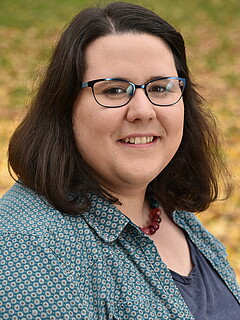PhD students 2nd cohort

Annemarie Müller, M.A.
Curriculum Vitae
Annemarie Müller (born 1992) completed her Bachelor studies from 2011 to 2014 at Friedrich-Schiller-University Jena with a major in folklore studies/cultural history, educational science and sociology. From 2014 to 2016 she completed her Master of folklore studies/cultural history at FSU Jena. During her studies, she was employed as an assistant in the project “Bildungslandschaft und Wissenskultur” at the Research Library Gotha / University Erfurt. After her studies, she worked as an assistant in the project “Automatic Handwriting Recognition” at the chair of gender history and in the project “eeFDM“ of the Research Data Management Helpdesk at FSU Jena. She has been a PhD student at the ‘Romanticism as a Model’ research training group since October 2018.
PhD project
In the Schlaraffenreych of the Mind. The Men’s Association Schlaraffia between Transnational and Romantic Sociability (1859-1909)
The relationship between transnationality and romanticism is a field largely unexplored especially because of predominantly national and European romantic discourses. The focus of this project in the science of history is to examine how transnationality and romanticism connect and unfold in a mostly “power”-free club space. For this purpose, the project will examine the men’s society and social association Schlaraffia founded in 1859 in Prague in more detail.
The character of this self-mocking and satiric association is the “maintenance of art, humour and friendship”. These ideas were implemented in a medieval role-playing game, which, superficially, followed a formal knightly tradition and elements of (late) romanticism from the 19th century. The friendship association forms a protected, socialising space of male club culture, which demands and promotes above all, the individual in his rhetoric-artistic originality and virtuosity.
Structurally, the association evolved from a group of about 23 members to, within three decades, transform into a transnational network that always remains connected to the city of its founding – Prague. The association is described not only by its structure and organisation but also by its rituals, its “knight’s game”. The constituent elements of the social club shall be presented and examined in terms of their romantic potential and their significance for the structure and ritual of the association. I will give particular consideration to the elaboration of the sociability and the concept of play, which can be described as central elements of romantic spaces of thought and action.
In addition, the work explores the question of how the association deals with the romantic irony of a meaningful perspective of the whole which was comprehensively discussed in the early romantic period around 1800 for the first time.
The questions this research raises should be methodically tested in the framework of the model approach developed by the research college “Romanticism as A Model”. Elucidation of the preceding questions will be attained through a historical source analysis of the club’s internal communication medium from 1874 – the newspaper. The internal communication will form the backbone of this project. Through the structure and rituals gleaned from the newspaper, there will be insight into everyday communication of the club.
Besides networking and romance research, the sociability and game research of bourgeois culture is also central to the project. These allow one to view the concept and operation of the club against the backdrop of bourgeois life.
Publications
Articles
Freundschaft auf Distanz. Kommunikation zwischen räumlich Getrennten, in: Thieme, Teresa (Hrsg.): Freundschaft! Mythos und Realität im Alltag der DDR (= Dokumentation der Städtischen Museen Jena, Bd. 28), Jena, 2015, S. 99-110
Von Traktoristinnen und Kulturschaffenden. Politische Selbstdarstellung auf Postwertzeichen anlässlich der DDR-Republikgeburtstage 1959 und 1964, in: Smolarski, René / Smolarski, Pierre / Vetter-Schultheiß, Silke (Hrsg.): Gezähnte Geschichte. Die Briefmarke als historische Quelle (= Post – Wert – Zeichen, Bd. 1), Göttingen, 2018, S. 485-510
Varia
Tagungsbericht zum Fachtag Digital Humanities in Thüringen: Daten vernetzen, Ressourcen verknüpfen. Neue Herausforderungen für den digitalen Wandel (nicht nur) in Thüringen, Forschungsbibliothek Gotha/Universität Erfurt, 09. August 2018, in: H-Soz-Kult, 15.12.2018
(Zus. mit Theresa Brehm, Maria Safenreiter und Felix Schallenberg): „Aber wir kommen ja nicht raus aus der deutschen Romantik, da kann man machen, was man will“ (Christian Petzold). Im Gespräch über den Film „Undine", in: Gestern I Romantik I Heute. Forum für Wissenschaft und Kultur, 14. Juli 2020, Jena. http://www.gestern-romantik-heute.uni-jena.de/index.php?cID=693
Presentations
Von Passagierflugzeugen, Traktoristinnen und Kernreaktoren. Politische Selbstdarstellung auf Postwertzeichen am Beispiel der Jahrestage der DDR 1959 und 1964 [Tagung: Gezähnte Geschichte. Die Briefmarke als historische Quelle, Universität Erfurt, 14. Oktober 2017]
Von Rittern und Verlobungsanzeigen. „Der Schlaraffia Zeyttungen“ als Kommunikationsmedium des transnationalen Männerbundes Schlaraffia [Workshop und Jahrestreffen des Arbeitskreises Historische Frauen- und Geschlechterforschung e.V., Region Mitte: Neue Forschungen zur Frauen- und Geschlechtergeschichte, Friedrich-Schiller-Universität Jena, 01. Dezember 2017]